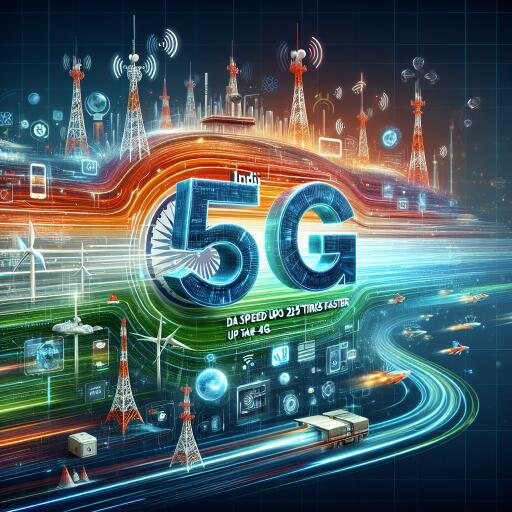India’s 5G Revolution: 25X Faster Than 4G
In an impressive leap forward, India initiated its journey into the future of telecommunications with the national rollout of 5G technology in October 2022. This groundbreaking transition has not only accelerated data connectivity speeds but also propelled the country into a new era of digital innovation and accessibility. With 5G’s superior speed and reliability compared to its 4G predecessor, India’s connectivity landscape is undergoing a remarkable transformation.
The embrace of 5G technology across India has led to an exponential increase in its utilization. Observations indicate a significant surge in mobile data consumption among 5G users, outpacing that of 4G users by 3.6 times. This surge is not just a testament to the hunger for high-speed internet but also a reflection of the transformative impact 5G is poised to have on countless facets of everyday life in India.
The advent of 5G brings with it an unparalleled speed, offering connections that are 25 times quicker than 4G. This enhancement in speed supports seamless streaming, instantaneous downloads, and facilitates real-time communication, thereby promising to revolutionize sectors like healthcare, education, manufacturing, and entertainment.
This transformation promises to catalyze innovation while stimulating economic advancement. The reduced latency and increased reliability of 5G networks make them an ideal backbone for emerging technologies such as the Internet of Things (IoT), artificial intelligence (AI), and augmented reality (AR). These technologies, powered by 5G, are set to unlock new avenues for business, amplify productivity, and foster a sense of inclusivity across the nation.
One of the most significant impacts of widespread 5G adoption is its potential to diminish the digital divide. By ensuring high-speed internet accessibility across various regions, including remote and rural areas, 5G stands as a catalyst for empowerment, enabling individuals across India to contribute to and benefit from economic and social advancements.
Furthermore, the shift towards 5G not only strengthens India’s digital infrastructure but also enhances its standing on the global stage. In the international arena of technological competitiveness, India’s investment in 5G infrastructure marks its commitment to becoming a leading hub for innovation and technology. This move positions India favorably for attracting global investment and fostering international partnerships in the tech sector.
However, the journey toward a fully implemented 5G network is not without its challenges. The deployment of 5G technology necessitates significant investment in infrastructure development, spectrum allocation, and regulatory frameworks. Moreover, there are pivotal concerns regarding cybersecurity, privacy, and the environmental impact of extensive 5G rollouts that must be rigorously addressed. Ensuring a responsible and sustainable approach to the adoption of 5G technology is crucial for maximizing its benefits while mitigating potential risks.
In conclusion, India’s 5G revolution is more than just an upgrade in internet speed; it’s a gateway to new possibilities in technology, innovation, and connectivity. As the country continues to navigate the complexities of 5G implementation, the promise of a digitally empowered future remains bright, ushering in a new chapter of growth and prosperity.










